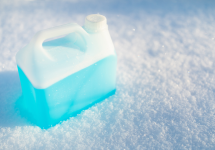What to do when chemical products freeze

What happens to chemical products that get chilled or frozen? Most of them survive it rather nicely and others - not so well. In general, a product frozen by extreme temperatures experiences some type of separation or crystal formation. Agitating or warming the product can often reverse these effects. Keep in mind that containers larger than one gallon are challenging to agitate and require more time to thaw.
Surviving the freeze
Many types of disinfectants, for example, can endure temporary freezing. If frozen and then thawed, they might appear cloudy but normal transparency returns when the product reaches room temperature. Other products such as alkaline detergents have components that will form crystals when frozen. The crystals can redissolve, but the product must be warmed for an extended period in order to redissolve all the crystals. Products made from emulsions, such as floor finishes and sealers, fabric protectors, and wood polishes, will sometimes separate into a solid and a liquid. When this happens, the product is usually permanently damaged.
A good rule of thumb: if temporarily frozen product does not return to a normal appearance after being thawed to room temperature and stirred or shaken, it is probably not usable.
What if the container breaks or cracks?
It is well known that water based substances expand when frozen and can burst a container irrespective of whether it is made from metal or from plastic. If a container should break and the product is still frozen and uncontaminated, place it in a clean bucket while thawing. In many cases, you can then transfer the thawed product to a clean, properly labeled container.
Protect your equipment
Also remember to empty chemical products from your equipment such as spray bottles, dispensers, foggers, etc., because any residual water will expand when frozen and cause permanent damage. Diluted products (i.e., those with water added) will freeze more easily than concentrates.
One final reminder (we all know this but it helps to review): water losses involve handling a lot of equipment that will retain some amount of water. Be sure to drain equipment that might be exposed to freezing conditions. Extractor pumps, pressure lines, and fittings can be expensive and draining them is a lot cheaper than replacing them.
QUICK GUIDE
It's frozen! Can I use it again?
Antimicrobials: Probably, if it returns to normal color and consistency
Detergents: Probably, but make sure any crystals that have formed are completely
re-dissolved by stirring at room temperature.
Emulsion-based products: Probably not, especially if product has separated.